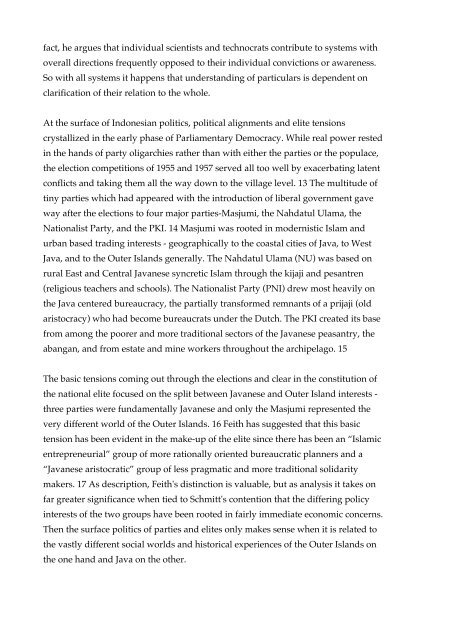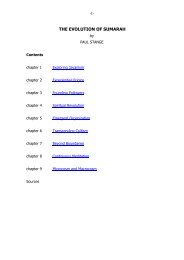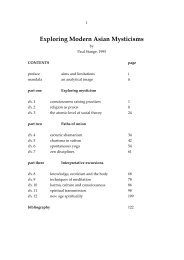Javanese Mystical and Marxist Dialectics - Paul Stange
Javanese Mystical and Marxist Dialectics - Paul Stange
Javanese Mystical and Marxist Dialectics - Paul Stange
Create successful ePaper yourself
Turn your PDF publications into a flip-book with our unique Google optimized e-Paper software.
fact, he argues that individual scientists <strong>and</strong> technocrats contribute to systems withoverall directions frequently opposed to their individual convictions or awareness.So with all systems it happens that underst<strong>and</strong>ing of particulars is dependent onclarification of their relation to the whole.At the surface of Indonesian politics, political alignments <strong>and</strong> elite tensionscrystallized in the early phase of Parliamentary Democracy. While real power restedin the h<strong>and</strong>s of party oligarchies rather than with either the parties or the populace,the election competitions of 1955 <strong>and</strong> 1957 served all too well by exacerbating latentconflicts <strong>and</strong> taking them all the way down to the village level. 13 The multitude oftiny parties which had appeared with the introduction of liberal government gaveway after the elections to four major parties-Masjumi, the Nahdatul Ulama, theNationalist Party, <strong>and</strong> the PKI. 14 Masjumi was rooted in modernistic Islam <strong>and</strong>urban based trading interests - geographically to the coastal cities of Java, to WestJava, <strong>and</strong> to the Outer Isl<strong>and</strong>s generally. The Nahdatul Ulama (NU) was based onrural East <strong>and</strong> Central <strong>Javanese</strong> syncretic Islam through the kijaji <strong>and</strong> pesantren(religious teachers <strong>and</strong> schools). The Nationalist Party (PNI) drew most heavily onthe Java centered bureaucracy, the partially transformed remnants of a prijaji (oldaristocracy) who had become bureaucrats under the Dutch. The PKI created its basefrom among the poorer <strong>and</strong> more traditional sectors of the <strong>Javanese</strong> peasantry, theabangan, <strong>and</strong> from estate <strong>and</strong> mine workers throughout the archipelago. 15The basic tensions coming out through the elections <strong>and</strong> clear in the constitution ofthe national elite focused on the split between <strong>Javanese</strong> <strong>and</strong> Outer Isl<strong>and</strong> interests -three parties were fundamentally <strong>Javanese</strong> <strong>and</strong> only the Masjumi represented thevery different world of the Outer Isl<strong>and</strong>s. 16 Feith has suggested that this basictension has been evident in the make-up of the elite since there has been an “Islamicentrepreneurial” group of more rationally oriented bureaucratic planners <strong>and</strong> a“<strong>Javanese</strong> aristocratic” group of less pragmatic <strong>and</strong> more traditional solidaritymakers. 17 As description, Feith's distinction is valuable, but as analysis it takes onfar greater significance when tied to Schmitt's contention that the differing policyinterests of the two groups have been rooted in fairly immediate economic concerns.Then the surface politics of parties <strong>and</strong> elites only makes sense when it is related tothe vastly different social worlds <strong>and</strong> historical experiences of the Outer Isl<strong>and</strong>s onthe one h<strong>and</strong> <strong>and</strong> Java on the other.




